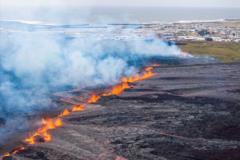Tourists and locals in south-west Iceland have been swiftly evacuated due to a significant volcanic eruption, threatening the town of Grindavik and the renowned Blue Lagoon spa. Since the eruption commenced around 9:45 AM local time, the volcano has been emitting a spectacular display of lava, with a fissure stretching 1.2 kilometers (approximately 0.75 miles) in length. The Icelandic Meteorological Office (IMO) has recorded several earthquakes throughout the day, raising concerns about the safety of the nearby community.
Grindavik resident Asrun Kristinsdottir expressed her urgency in evacuating after hearing emergency sirens, stating her lifelong habit of being prepared for such situations. However, she noted the unique intensity of this event due to constant seismic activity. Unfortunately, some residents, estimated to be around seven or eight households, chose to remain in their homes despite official recommendations for evacuation.
Ulfar Ludviksson, the regional police commissioner, confirmed that the town's protective measures were compromised as a new fissure erupted meters within the safety barriers, complicating the situation. The concerns escalated as the community was warned of possible lava flows encroaching upon inhabited areas. Additionally, a broken hot water pipe indicated significant geological changes occurring within Grindavik, as reported by the IMO.
As the state of emergency unfolded, many of the town’s 4,000 inhabitants had previously evacuated in 2023 due to similar volcanic threats. Notably, locals like Thormar Omarrson, who once ran a beloved pizza restaurant in Grindavik, shared sentiments of heartbreak over leaving their ancestral homes. Unfortunately, some friends opted to stay behind, resisting the evacuation orders.
Meteorological experts highlighted the expanding reach of magma beneath the eruption, with the active magma corridor measuring 11 kilometers (6.8 miles), extending northeast beyond previous eruption patterns. Current wind conditions suggest that gas pollution from the eruption might drift toward the capital region, posing further challenges.
The Reykjanes Peninsula, where this latest activity has been recorded, has a long history of geological events, with eruptions occurring frequently since 2021. Experts remind the public that Iceland, situated atop the Mid-Atlantic Ridge, harbors 33 active volcano systems, underscoring the ongoing threat and significance of monitoring volcanic activity in the region.



















